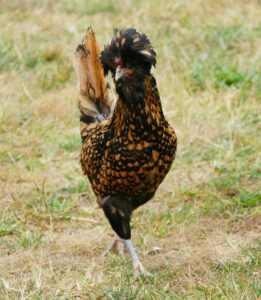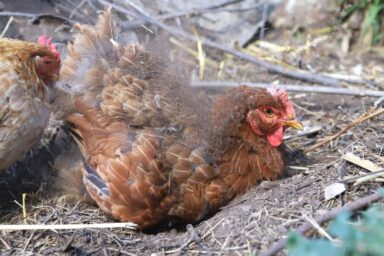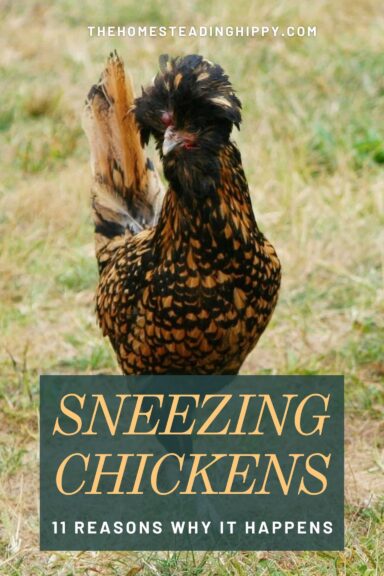If you’ve owned chickens for any length of time you are probably well acquainted with their antics. If you haven’t, there’s a lot to learn including what all the different sounds they make mean.

If you’ve been paying attention to your birds, you might have heard a high-pitched whistle or “yelping” sound before. Not crowing, not clucking- something else!
What you’ve heard is in reality a chicken’s sneeze. Yes, chickens sneeze just like most other animals, and they sneeze for many of the same reasons.
It’s important to stay on top of chronic sneezing because it might indicate serious illness or other ailments, but thankfully, much of the time it’s harmless and transient. The only way to know for sure is to learn what the causes are!
Keep reading and I’ll tell you about 11 typical causes of chicken sneezes.
Does Sneezing Indicate Illness in Chickens?
No, not necessarily. I hope that’s a relief if you came to this article in a panic. Chickens sneeze for all kinds of reasons, from the mundane to the morbid.
Your chickens might be sneezing because of simple airborne contaminants or even seasonal allergies! Nothing to really get worried over.
On the other hand, repeated sneezing, and especially chronic sneezing day in and day out is definitely an indication that something is wrong. On average, a chicken will sneeze once every 10 to 30 minutes, so an occasional sneeze really is nothing to worry about.
But if you notice a chicken doing it a lot more often than that, and sneezing fits lasting for hours or even days, you need to investigate and do it quickly. Now with that out of the way, let’s get on to the possible causes…
Pollen
No surprises here! Pollen is a perennial cause of sneezing in chickens as it is with people and other animals.
If you live in an area with lots of pollen-producing trees and other plants, your chickens are probably going to sneeze their heads off when they are blooming. Likewise, certain kinds of pollen, like ragweed, are particularly irritating to chickens.
Keep notes on when your birds seem to be at their sneeziest: If you notice that it coincides with pollen season at various times of the year, that’s probably all it is.
Mold and Fungus
There are all kinds of molds and fungi out in the world that are serious respiratory tract irritants, especially when they release reproductive spores and other particles.
Some of them can be quite dangerous aside from being an irritant, so if you suspect any of them are the root cause of sneezing in your flock you’ve got to take remedial action.
If you live in a damp part of the country mold is always going to be an issue, but it’s also a particular problem inside the chicken coop:
Waste, a lack of light, and high moisture owing to poor ventilation will let mold rampage out of control and accordingly your chickens will be sneezy and sickly with ongoing exposure. Stay on top of keeping that coop cleaned out, sanitized and ventilated.
Harmful Gasses
Birds, as a category, are very vulnerable to various gasses that can irritate or hurt them. Chickens are no different. Even trace amounts can cause lots of sneezing, and one of the most common is ammonia coming from their droppings.
Again, they are highly likely to be exposed to high concentrations of ammonia if you don’t stay on top of keeping their coop mucked out; chicken poop contains compounds which, naturally, contain ammonia that will off-gas.
But if that isn’t it, make sure there aren’t any fumes from open chemical containers, barbecue grills, or other sources wafting over to their run or coupe.
Other Allergens
There are all kinds of allergens that might make chickens sneeze, not just pollen. Potentially, even dander from other animals could set them off!
It isn’t out of the question that they could even be allergic to compounds or dyes used in mulch, wood shavings, or anything else that is in their immediate environment assuming it can get on the wind and drift towards them.
This can be very difficult to track down, but if you’ve eliminated all of the other more obvious potential causes of sneezing, it is time to start looking even closer and eliminating other possible allergens if you can.
Be especially vigilant if you notice your chickens start sneezing more after you’ve replaced ground cover, bedding, or something else with a new brand or just a new batch- sometimes the things you buy can be contaminated from the factory!

Airborne Dust
Common dust, of any kind, can easily irritate the airways of chickens and cause sneezing, particularly if a big cloud gets knocked into the air. Dusty hay is a major culprit.
Likewise, a vehicle moving over a dirt road or gravel driveway and very dry conditions or a spill or dumping of anything else that results in a huge plume of dust will certainly result in sneezing.
This is easy enough to determine if any such thing is happening on or near your property, but it might be caused by construction or heavy traffic on a neighboring property or nearby road.
The trick is that you should look for the sneezing to subside as the dust clears out and blows away. If it doesn’t, there might be another cause or one that is aggravating the condition.
Sudden Temperature Changes
Believe it or not, lots of owners report that sudden temperature and weather changes can cause their chickens to go into sneezing fits for a short period. Extreme temperatures, hot or cold, or a sudden spike or corresponding drop in humidity might make your chicken sneeze!
Strange, but undoubtedly true. However, expect the sneezing to stop as your birds adjust to the changing conditions. You know the drill by now: if the sneezing persists, you must look closer.
Bird Flu
Now we get to some of the worst things that might be causing sneezing in your chickens. Bird flu is an infamous disease, one that is lethal to chickens and very dangerous to humans. It isn’t common, not these days, but it is never out of the question and so you must be cautious.
Sneezing is a symptom, but you can also look for other symptoms like lethargy, and lack of energy, diarrhea and swelling of all tissues around the head and face.
Bird flu is serious and extremely contagious. Testing and quarantine protocols are required if you even suspect one of your birds has it or know that a neighbor’s bird does.
CRD
CRD is the uncreative acronym for chicken respiratory disease, and as you might expect has many respiratory symptoms besides just sneezing, including labored breathing, coughing and squeaky or wheezy breaths.
The good news is that it isn’t nearly as dangerous as bird flu, above, and a healthy chicken can likely deal with this bacterial infection and get better. But stressors of any kind are significant comorbidities, including injury, other illnesses, stressful social life, unsanitary living conditions and more.
Prompt intervention and improvement of conditions, along with supporting care, means a bird is likely to survive.
Newcastle Disease
An extremely deadly and debilitating ailment, Newcastle disease shows symptoms first with sneezing and coughing which is followed up with diarrhea, inability to stand, discharge around the beak and then eventually paralysis followed by death.
Not to scare you, but this is one of the worst possible outcomes for your chickens and an extremely grueling death on top of it. If you ever see a bird go through it, you’ll never react to one of their little sneezes the same way again.
Treatment is possible if it is caught early, so be very alert for any and all symptoms aside from sneezing alone.
Coryza
Another bacterial disease and, mercifully, one that is not fatal barring major complications it results in coughing and acute sneezing followed by a lack of interest in food and water.
These stressors could turn into a vicious cycle which can be seriously debilitating to affect the chickens, however, and it is made worse by the fact that it is extremely contagious and can quickly spread throughout your flock.
If suspected or confirmed, quarantine the affected bird at once.
Parasites
Various parasites of the lungs and airways can result in sneezing, and often coughing, as chickens try desperately to dislodge them and breathe freely again. Gapeworms and other lungworms are among the most common.
Again, early detection, identification and corresponding treatment are possible and have a very high chance of success with no lasting effects.
What Should You Do if Your Chicken is Sneezing?
If your chicken is sneezing, context is everything. As mentioned above, a handful of periodic sneezes throughout the day is completely normal and nothing to worry about.
A bird that’s sneezing more or less consistently, or multiple chickens sneezing consistently, is cause for concern and investigation. Constant sneezing is always a cause for immediate intervention.
Look for causes that you can deal with at once, but make it a point to get your chickens to the vet as soon as you can to check for various diseases detailed above.

Tim is a farm boy with vast experience on homesteads, and with survival and prepping. He lives a self-reliant lifestyle along with his aging mother in a quiet and very conservative little town in Ohio. He teaches folks about security, prepping and self-sufficiency not just through his witty writing, but also in person.
Find out more about Tim and the rest of the crew here.

After having raised chickens for 14 years in Florida, I’ve noticed my Chickens sneeze after temperature changes (one day it’s 50, next day it’s 85). Or in the spring when everything and anything blooms and pollen is thick in the air. I’ve never worried.
I call it Buck-choo.